Home Remedies For Loose Motion: 11 Effective Natural Treatments
Manage those uncomfortable stools with natural cures to treat them effectively.
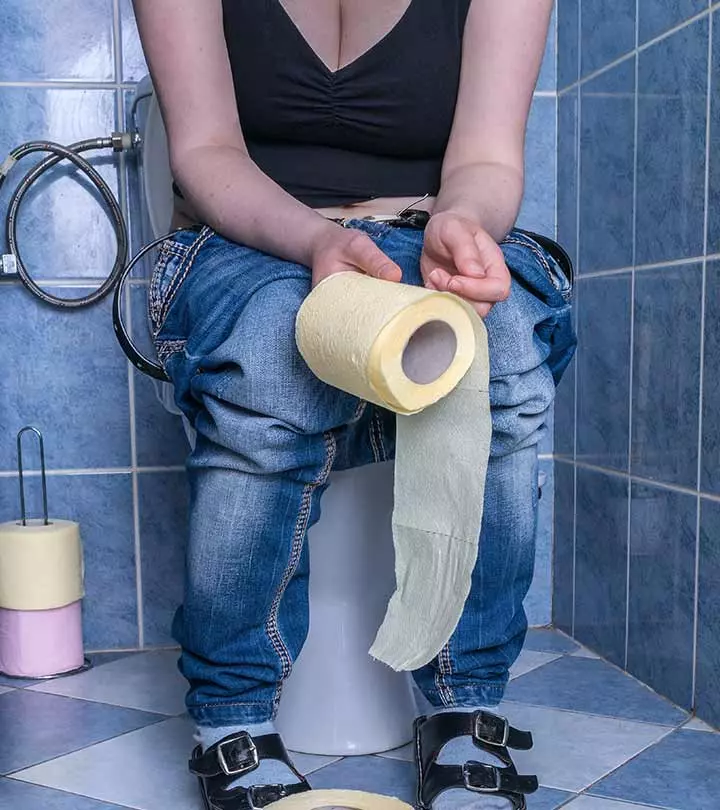
Image: Shutterstock
Loose motion is a prevalent ailment that affects people of all ages. It normally happens after eating, although it can happen at any time of day. Here, we will discuss the home remedies of loose motion. Loose motion can be extremely inconvenient and exhausting. It can obstruct your regular activities and may lead to fatigue and dehydration if ignored. Scroll down to learn how to manage its symptoms.
In This Article
What Causes Loose Motion?
Loose motions are stools that are watery or mushy and may have a strong foul odor. When loose motions occur multiple times (three or more) during the day, the condition is known as diarrhea (1). The loss of fluids and minerals from your body can lead to dehydration and electrolyte imbalances within the body.
There are three different types of diarrhea. They are:
- Acute: Lasts for one to two days
- Persistent: Lasts for about two to four weeks
- Chronic: Lasts more than four weeks or keeps coming back over time
These types can be caused due to various reasons, such as viral infections. Gastroenteritis, and other viral infections, are one of the leading causes of loose motion in adults (2). Other causes include:
- Bacterial infections like dysentery
- Intestinal diseases, such as colitisi A chronic digestive condition in which the colon is irritated or inflamed by a bacterial or viral infection. and irritable bowel syndrome (IBS)
- Allergy to certain foods
- Malabsorption of food
- Certain medicines that can have a laxative effect
- Excessive consumption of alcohol
- Food poisoning
- Stomach flu

Byron, a blogger, shared his experience about loose motion caused by antibiotics. He wrote, “As my diet has been the same for some time, the only factor of change is the taking of an antibiotic, which I finished on Friday. The pill basically can serve to get rid of the good bacteria in my small intestines, thus causing gas and loose bowel movements (i).”
Infants usually produce loose stools during stomach upset, but they should be mostly soft. If the stool is watery and is accompanied by fever or congestion, it is diarrhea.
Note: Persistent loose bowel movements can have life-threatening consequences, and, therefore, must be treated immediately. You need medical back up if there is blood in the stool, you are so dehydrated that you are no longer urinating, or you have a fever.
You experience watery stools but are not sure which symptoms to look out for. We have got you covered! Let us find out in the next section.
Key Takeaways
- Causes like bacterial and viral infections and allergies may result in loose motion.
- Include probiotics, and fluids such as cumin and coconut water in your diet to get fast relief from this condition.
- Over-the-counter medications like loperamide may treat the condition effectively.
- Healthy, hygienic, and fiber-rich foods may help you prevent loose motions.
Symptoms Of Loose Motion
People with frequent loose motion (or diarrhea) may have one or more of these symptoms (3):
- Nausea
- Abdominal pain
- Cramping
- Bloating
If it is caused due to bacteria, viruses, or parasites such as E.coli and norovirus, it may also have the following symptoms (3):
- Fever
- Chills
- Vomiting
- Light-headedness
- Dizziness
- Bloody stools
Loose motions may also lead to dehydration if you do not drink enough fluids during it, which may cause the following symptoms (3):
- Thirst
- Dry mouth
- Dark-colored urine
- Urinating less than usual
- Light-headedness
- Fainting
- Weakness
If you experience any of these symptoms, it is best to consult a healthcare expert. You may also try some natural remedies. Here are some remedies that you can try to get relief from loose motion.
Natural Ways To Treat Loose Motion
Struggling with loose motions? No need to panic; there are some handy home remedies to get rid of diarrhea that might just do the trick. From soothing teas to simple dietary changes, these natural fixes can help settle your stomach and get you feeling better quickly.
1. Coconut Water

Research shows that young coconut water can be used as an oral rehydration solution for children with mild diarrhea (4). However, it should not be used for patients who are severely dehydrated or have developed kidney issues.
You Will Need
1-2 glasses of coconut water
What You Have To Do
Consume a glass or two of coconut water.
How Often You Should Do This
Do this 1 to 2 times daily for a few days.
Note: Excessive consumption of coconut water can cause an increase in the level of sodium in your blood. Hence, you must stop consuming it once your symptoms have subsided. Also, as the coconut matures, the levels of potassium and sodium vary. Ensure you pick young coconuts.
2. Yogurt
Yogurt is a probiotic that can help regulate the gut bacteria (5). Along with this, it was also found to help in the treatment and prevention of diarrhea (6).
You Will Need
A cup of plain yogurt
What You Have To Do
Consume a cup of plain yogurt after your meals.
How Often You Should Do This
Do this 2 times daily for a week.
3. Cumin (Jeera) Water
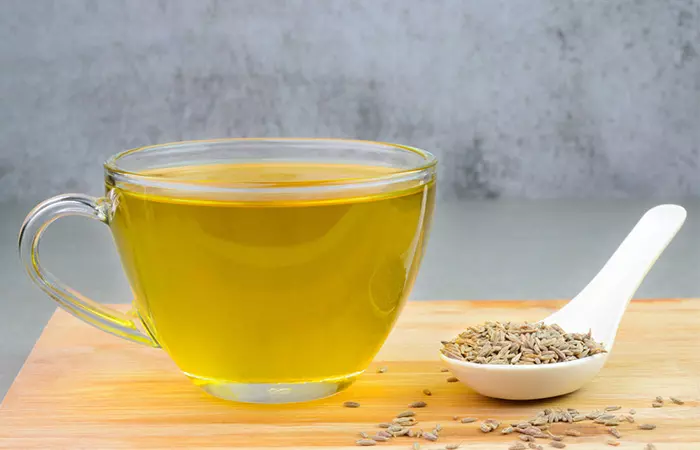
Cumin (or jeera) can have a therapeutic effect on your gastric system. It may help regulate regular bowel movement, which, in turn, can help reduce indigestion and loose motion (7).
You Will Need
- 1 teaspoon of cumin seeds
- 1 glass of water
What You Have To Do
- Add a teaspoon of cumin seeds to a glass of water.
- Bring this mixture to a boil in a saucepan.
- Allow it to cool a little before consuming it.
How Often You Should Do This
Consume this solution 3 to 4 times daily, preferably after every meal.
4. Chamomile Tea
Chamomile exhibits powerful antidiarrhoeal, antispasmodici A medication or other agent that treats, avoids, or lessens the incidence of muscle spasms, particularly those that affect smooth muscles. , and antisecretory properties (8). This may help relieve loose motion by relaxing the muscles of the gut.
You Will Need
- 1-2 teaspoons of dry chamomile flowers
- 1 cup of water
- 1 teaspoon honey
What You Have To Do
- Add one or two teaspoons of chamomile herb to a cup of water and bring it to a boil in a saucepan.
- Simmer for 5 minutes and strain.
- Allow it to cool for a while before adding honey to it.
- Consume immediately.
How Often You Should Do This
You can drink chamomile tea 2-3 times daily for a few days.
Note: If you are allergic to flowers from the Asteraceae family, you must avoid chamomile as it may cause an allergic reaction. In large doses, it may cause vomiting.
5. Apple Cider Vinegar
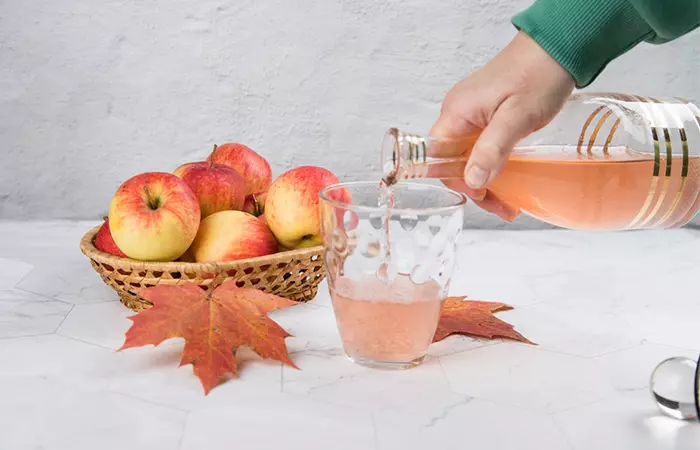
Research shows that apple cider vinegar exhibits antimicrobial properties (9), (10). This may help fight the microbes that cause infections and loose motion.
You Will Need
- 2 teaspoons of apple cider vinegar
- 1 glass of warm water
- Honey to taste
What You Have To Do
- Add two teaspoons of apple cider vinegar to a glass of warm water and mix well.
- You can add a little honey for flavor and consume immediately.
How Often You Should Do This
You can consume this solution 2 times daily for a couple of days.
Note: Consuming large amounts of undiluted ACV can cause digestive issues and increase potassium levels in your body. This will aggravate your condition.
6. Ginger
Certain bowel disorders, such as gastritis, may be caused by bacteria. Ginger is rich in bioactive compounds that possess anti-inflammatory and antibacterial properties (11), (12). This may help soothe the gastric system and fight the infection causing loose motion.
You Will Need
- 1-2 teaspoons of freshly extracted ginger juice
- Honey to taste
What You Have To Do
- Take two teaspoons of freshly extracted ginger juice and add some honey to it.
- Consume this mixture directly.
- If the flavor is too strong for you, you can mix the ginger extract with a cup of warm water before consuming it.
How Often You Should Do This
Do this at least 2 to 3 times daily until you notice an improvement in your condition.
7. Peppermint And Honey
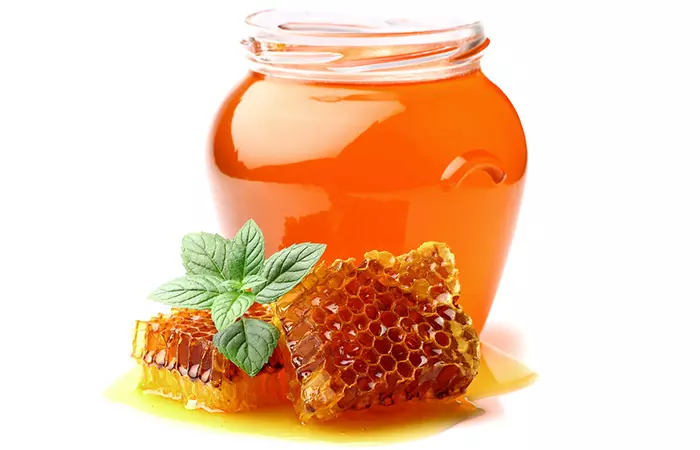
Peppermint contains menthol, which exhibits antispasmodic properties (13). This may help soothe your stomach, thereby relieving symptoms of diarrhea.
You Will Need
- 1 teaspoon of peppermint
- 1 teaspoon of freshly extracted lemon juice
- 1 teaspoon honey
- 1 cup of warm water
What You Have To Do
- Mix a teaspoon each of fresh peppermint, lemon juice, and honey.
- Add this mixture to a cup of warm water. Stir well.
- Consume immediately.
How Often You Should Do This
You can do this 2 times daily.
8. Cinnamon And Honey
Cinnamon possesses anti-inflammatory, antioxidant, and antimicrobial properties (14). This may help relax an upset tummy by eliminating any infection-causing loose motion and providing relief from discomfort.
You Will Need
- 1/2 teaspoon of powdered cinnamon
- Honey to taste
- 1 glass of warm water
What You Have To Do
- Mix half a teaspoon of cinnamon powder and one teaspoon of honey with a glass of warm water.
- Consume this solution while it is warm.
How Often You Should Do This
Do this 2 to 3 times a day for a few days.
Note: Consuming too much cinnamon can increase the risk of liver damage. Hence, use it only in prescribed quantities.
9. Oat Bran
In a study, unprocessed oat bran tablets were found to lessen the occurrence of diarrhea (15). Hence, oat bran can help reduce loose motion as well.
You Will Need
1 bowl of cooked oat bran
What You Have To Do
Consume a bowl of cooked oat bran.
How Often You Should Do This
Consume this 2 times daily.
10. Moringa (Drumstick) Leaves
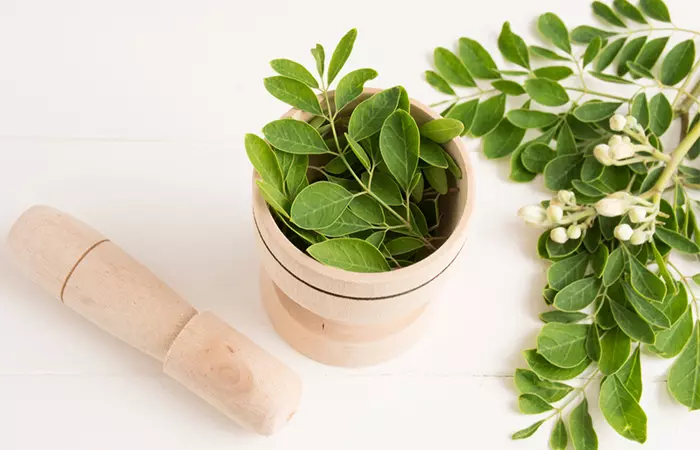
Moringa leaves possess antioxidant and antimicrobial properties (16), (17). These properties can help eliminate the infection that causes loose motion and provide relief from the discomfort.
You Will Need
- 1 teaspoon of moringa (drumstick) extract
- Honey to taste
What You Have To Do
- Extract a teaspoon of fresh juice from moringa leaves.
- Add some honey to it and consume immediately.
- You can also consume dried moringa (drumstick) leaves by adding them to your daily diet.
How Often You Should Do This
Do this once daily for a couple of days.
Note: Do not consume more than the recommended quantity of drumstick leaves as this might worsen your condition. This is because, in high doses, they can have a laxative effect.
11. Black Tea With Lemon
Several studies show that black tea possesses antioxidant, anti-inflammatory, and antimicrobial properties (18), (19). These properties may help soothe inflammation in the digestive tract and fight off the pathogensi Any organism or agent such as a virus or a bacterium that has the ability to produce an infectious disease. causing loose motion.
You Will Need
- 1 teaspoon of tea powder
- 1 teaspoon of lemon juice
- 1 cup of water
- Honey to taste
What You Have To Do
- Add a teaspoon of tea leaves to a cup of water and bring it to a boil in a saucepan.
- Simmer for 5 minutes and strain.
- Wait for the tea to cool a bit before adding the honey and lemon juice.
- Consume immediately.
How Often You Should Do This
You can sip on this tea 3 times a day.
Medical Treatment Options
If you are experiencing loose stools, you can also opt for the following over-the-counter antidiarrheal medicines:
- Loperamide is an easily available anti-diarrheal medicine that can help increase fluid absorption in the digestive tract by decreasing peristalsis or bowel movement (20).
- Bismuth subsalicylate (commonly sold as Pepto-Bismol) can have an antisecretory effect on the digestive system, thereby reducing frequent bowel movements (21).
 Quick Tip
Quick TipIn addition to over-the-counter medicines, it is helpful to know what foods can be included in your diet to accelerate your recovery.
What To Eat During Loose Motions And What To Avoid
- ORS
Oral Rehydration Solution is a mixture of sugar, electrolytes, and water. This is to be taken orally and is known to restore the fluid balance lost due to diarrhea or vomiting (22). This solution is made by mixing half a teaspoon of salt with six teaspoons of sugar in one liter of water. Dr. Sarah Yovino, MD, General Physician, says, “Staying hydrated is crucial to replace fluids lost during episodes of loose motion.”
- BRAT
The BRAT diet, also known as the low-residue diet, is helpful in soothing your digestive system. A bland diet is a lot easier to digest and thus helps your digestive system relax. It can also help decrease the frequency of bowel movements and firming your stool due to its bland nature (23). BRAT stands for ‘bananas, rice, apples, toast.’ In this diet, you will limit your food intake to these foods (24). Notably, bananas help with constipation by providing essential nutrients while remaining gentle on the digestive system, offering a reassuring solution to your discomfort.
What To Avoid
Avoid the intake of milk and dairy products like cheese, fiber-rich foods with insoluble fibers, spicy food, alcohol, caffeinated beverages, aerated beverages, etc. (25). Foods that make you poop, such as high-fiber items and spicy dishes, should be avoided as they may exacerbate symptoms.
 Quick Tip
Quick TipThere may be certain instances when you get diarrhea and no matter the remedies you follow or the right foods you eat, it persists. This calls for medical attention. Scroll down to learn more.
When To Seek Medical Attention
You should seek medical attention for loose motions if you have severe abdominal pain, a high fever, blood in your stool, or signs of dehydration like dry mouth, dizziness, or dark urine. These signs may indicate serious issues, such as infections or bleeding in the digestive tract. If the diarrhea lasts more than two days without improvement, it is important to consult a healthcare provider to prevent further complications.
However, it is always best to prevent it. So, ensure that you follow these tips to prevent the recurrence of loose motion.
Prevention Tips
- Stay hydrated by drinking enough water.
- Consume soluble fiber-rich foods like broccoli, peas, bananas, etc.
- Identify foods that you may be allergic to and stay away from them.
- Consume healthy and hygienic food. You may have to avoid fruit or fruit juices because an irritated GI tract may not be able to digest fructose.
- Wash your hands well with soap and water after using the bathroom and before touching food to avoid infections.
- Avoid alcohol.
Infographic: When To See A Doctor For Loose Motions
Loose motions are distressing, inconvenient, and exhausting. Home remedies like coconut water and over-the-counter medications can help manage this condition at home. However, home remedies may fail to provide relief, and the symptoms may worsen over time. Check out the infographic below to figure out when you must see a doctor.
Some thing wrong with infographic shortcode. please verify shortcode syntax
Viral and bacterial infections, food poisoning, gastroenteritis, food allergy, excess alcohol intake, etc., can cause loose or watery stools. If loose stools occur three or more times during the day, you may probably be suffering from diarrhea. Fortunately, you may consider home remedies to treat loose motion. Natural ingredients like yogurt, coconut water, cumin water, chamomile tea, apple cider vinegar, ginger, cinnamon and honey, oat bran, etc., help regulate bowel movements. Some of these have anti-inflammatory and antimicrobial properties that help treat infections or conditions responsible for loose stools. Drink ORS to restore electrolyte balance and follow a BRAT diet to avoid burdening the digestive system further. However, consult your doctor if symptoms persist.
Frequently Asked Questions
Are there any potential risks associated with consuming home remedies for loose motion?
Yes, there can be. Dr. Yovino adds, “Some home remedies may not be effective and could potentially cause dehydration or other complications.”
Is lemon juice good when you have loose motion?
Yes. Lemon juice added to water with a pinch of salt and sugar may be helpful in dealing with loose motion. This is because lemon has antibacterial properties that can help inhibit the growth of diarrhea causing pathogens and help recovery from loose motion (26).
Is honey good for loose motion?
Yes. Honey can shorten the duration and severity of loose motion in individuals with diarrhea caused due to bacterial activity. In individuals with non-bacterial diarrhea, honey can be helpful as part of rehydration therapy (27).
Should I drink more water in loose motion?
Yes. You lose a significant amount of fluids when you have loose motions. Drinking plenty of water ensures you do not face dehydration.
How long should loose motion last?
According to anecdotal evidence, a loose motion may last a few days to a week. If it persists beyond one week, you must consult your healthcare provider, as it might be an underlying sign of a serious issue.
Illustration: Home Remedies For Loose Motion, Treatment, And Prevention
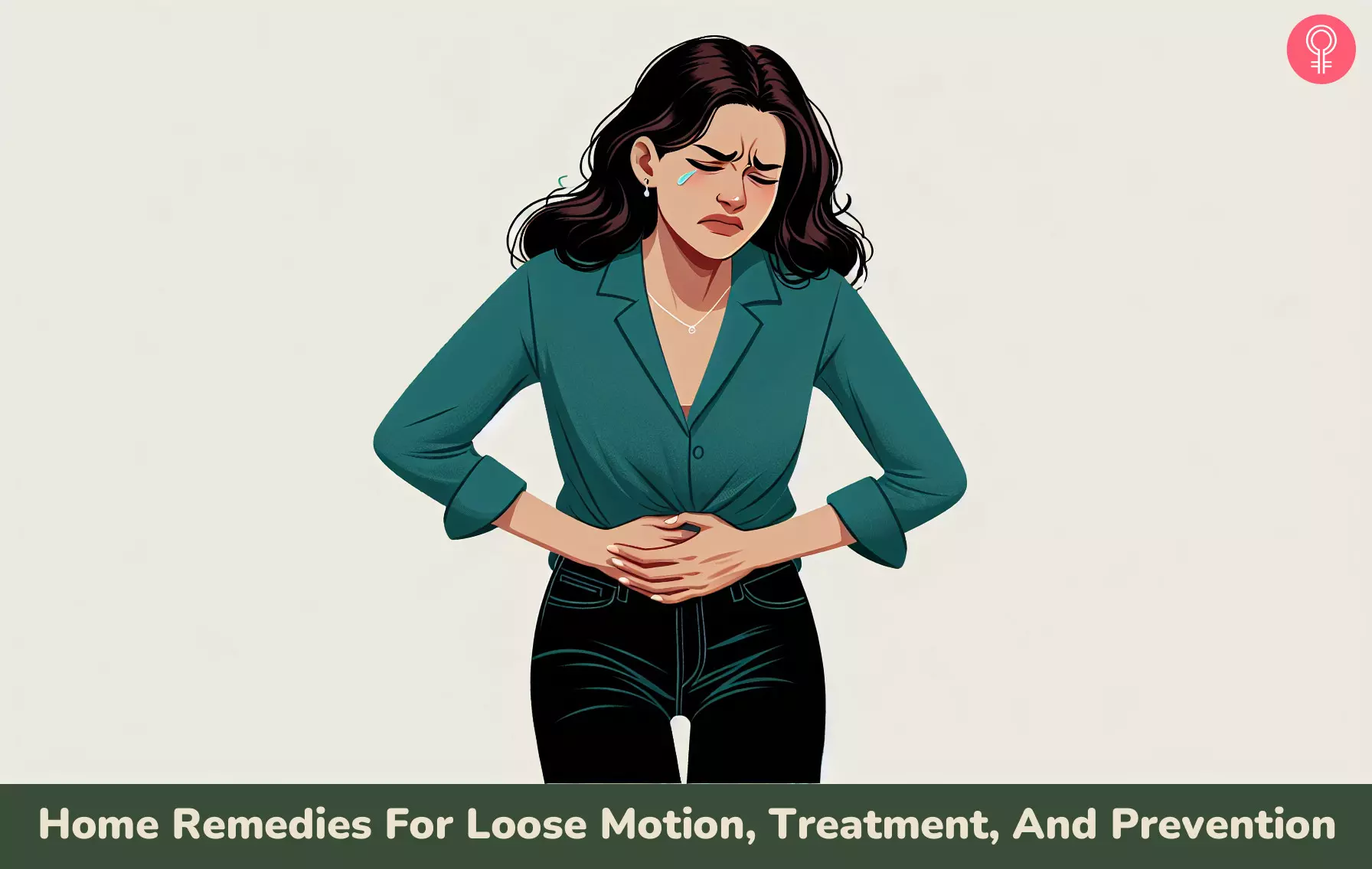
Image: Dall·E/StyleCraze Design Team
References
Articles on StyleCraze are backed by verified information from peer-reviewed and academic research papers, reputed organizations, research institutions, and medical associations to ensure accuracy and relevance. Read our editorial policy to learn more.
- Diarrhea, US National Library of Medicine, National Institutes of Health.
https://www.ncbi.nlm.nih.gov/books/NBK448082/ - Chapter 88 Diarrhea, Clinical Methods: The History, Physical, and Laboratory Examinations, US National Library of Medicine, National Institutes of Health.
https://www.ncbi.nlm.nih.gov/books/NBK414/ - Symptoms & Causes Of Diarrhea
https://www.niddk.nih.gov/health-information/digestive-diseases/diarrhea/symptoms-causes - Coconut water as a rehydration fluid. The New Zealand Medical Journal, US National Library of Medicine, National Institutes of Health.
https://pubmed.ncbi.nlm.nih.gov/290921/ - Effects of Dietary Yogurt on the Healthy Human Gastrointestinal (GI) Microbiome, MDPI, US National Library of Medicine, National Institutes of Health.
https://www.ncbi.nlm.nih.gov/pmc/articles/PMC5374383/ - Evaluation of yogurt effect on acute diarrhea in 6-24-month-old hospitalized infants. The Turkish Journal of Pediatrics, US National Library of Medicine, National Institutes of Health.
https://www.ncbi.nlm.nih.gov/pubmed/16848109 - Cuminum cyminum and Carum carvi: An update, Pharmacognosy Review, US National Library of Medicine, National Institutes of Health.
https://www.ncbi.nlm.nih.gov/pmc/articles/PMC3210012/ - Antidiarrhoeal, antisecretory and antispasmodic activities of Matricaria chamomilla are mediated predominantly through K+-channels activation, BMC Complementary and Alternative Medicine, US National Library of Medicine, National Institutes of Health.
https://www.ncbi.nlm.nih.gov/pmc/articles/PMC4410481/ - Effect of dietary supplementation with apple cider vinegar and propionic acid on hemolymph chemistry, intestinal microbiota and histological structure of hepatopancreas in white shrimp, Litopenaeus vannamei. Fish & Shellfish Immunology, US National Library of Medicine, National Institutes of Health.
https://www.ncbi.nlm.nih.gov/pubmed/30553888 - Vinegar: Medicinal Uses and Antiglycemic Effect, Medscape General Medicine, US National Library of Medicine, National Institutes of Health.
https://www.ncbi.nlm.nih.gov/pmc/articles/PMC1785201/ - Antibacterial activity of [10]-gingerol and [12]-gingerol isolated from ginger rhizome against periodontal bacteria. Phytotherapy Research, US National Library of Medicine, National Institutes of Health.
https://pubmed.ncbi.nlm.nih.gov/18814211/ - Anti-Oxidative and Anti-Inflammatory Effects of Ginger in Health and Physical Activity: Review of Current Evidence, International Journal of Preventive Medicine, US National Library of Medicine, National Institutes of Health.
https://www.ncbi.nlm.nih.gov/pmc/articles/PMC3665023/ - Efficacy of Peppermint oil in diarrhea predominant IBS – a double blind randomized placebo – controlled study. Mymensingh Medical Journal, US National Library of Medicine, National Institutes of Health.
https://www.ncbi.nlm.nih.gov/pubmed/23416804 - Cinnamon: A Multifaceted Medicinal Plant, Evidence Based Complementary and Alternative Medicine, US National Library of Medicine, National Institutes of Health.
https://www.ncbi.nlm.nih.gov/pmc/articles/PMC4003790/ - Oat bran treats diarrhea. Positively Aware, US National Library of Medicine, National Institutes of Health.
https://www.ncbi.nlm.nih.gov/pubmed/11366840 - Antioxidant activity and total phenolic content of Moringa oleifera leaves in two stages of maturity. Plant Foods for Human Nutrition, US National Library of Medicine, National Institutes of Health.
https://www.ncbi.nlm.nih.gov/pubmed/19904611 - ANTIMICROBIAL ACTION OF THE LEAF EXTRACT OF MORINGA OLEIFERA LAM. Ancient Science of Life, US National Library of Medicine, National Institutes of Health.
https://www.ncbi.nlm.nih.gov/pmc/articles/PMC3331240/ - Evaluation of anti-inflammatory effects of green tea and black tea: A comparative in vitro study, Journal of Advanced Pharmaceutical Technology and Research, US National Library of Medicine, National Institutes of Health.
https://www.ncbi.nlm.nih.gov/pmc/articles/PMC3401676/ - Antioxidant and antibacterial properties of green, black, and herbal teas of Camellia sinensis, Pharmacognosy Review, US National Library of Medicine, National Institutes of Health.
https://www.ncbi.nlm.nih.gov/pmc/articles/PMC3249787/ - Loperamide: a pharmacological review. Review in Gastroenterological Disorders, US National Library of Medicine, National Institutes of Health.
https://pubmed.ncbi.nlm.nih.gov/18192961/ - Bismuth subsalicylate in the treatment and prevention of diarrheal disease. Drug Intelligence and Clinical Pharmacy, US National Library of Medicine, National Institutes of Health.
https://pubmed.ncbi.nlm.nih.gov/3308391/ - THERAPY FOR DIARRHEA, Nutritional Management of Acute Diarrhea in Infants and Children, US National Library of Medicine, National Institutes of Health.
https://www.ncbi.nlm.nih.gov/books/NBK219096/ - Bland Diet, US National Library of Medicine, National Institutes of Health.
https://www.ncbi.nlm.nih.gov/books/NBK538142/ - Dietary advice for acute diarrhoea in general practice: a pilot study, British Journal of General Practice, US National Library of Medicine, National Institutes of Health.
https://www.ncbi.nlm.nih.gov/pmc/articles/PMC1313285/pdf/10198499.pdf - Diet in irritable bowel syndrome: What to recommend, not what to forbid to patients! World Journal of Gastroenterology, US National Library of Medicine, National Institutes of Health.
https://www.ncbi.nlm.nih.gov/pmc/articles/PMC5467063/ - Lemon ( Citrus limon ) Juice Has Antibacterial Potential against Diarrhea-Causing Pathogen, IOP Conference Series: Earth and Environmental Science, ResearchGate
https://www.researchgate.net/publication/330264287_Lemon_Citrus_limon_Juice_Has_Antibacterial_Potential_against_Diarrhea-Causing_Pathogen - Honey: its antibacterial action in the treatment of gastroenteritis, US National Library of Medicine, National Institutes of Health.
https://pubmed.ncbi.nlm.nih.gov/12314387/
Read full bio of Dr. Zeel Gandhi
- Dr. Sarah Yovino is a double board-certified master injector who specializes in non-surgical medical aesthetics and whole body rejuvenation. She graduated from the University of Miami Miller School of Medicine, and now leads the non-surgical department of Ideal Face & Body. Dr. Sarah is also known for her painless lip augmentation technique that involves the use of dental blocks and her exlcusive custom-formulated numbing cream. She also uses lasers, radiofrequency, microneedling, chemical peels, as well as Botox and dermal fillers to offer her clients natural-looking results.
 Dr. Sarah Yovino is a double board-certified master injector who specializes in non-surgical medical aesthetics and whole body rejuvenation. She graduated from the University of Miami Miller School of Medicine, and now leads the non-surgical department of Ideal Face & Body. Dr. Sarah is also known for her painless lip augmentation technique that involves the use of dental blocks and her exlcusive custom-formulated numbing cream. She also uses lasers, radiofrequency, microneedling, chemical peels, as well as Botox and dermal fillers to offer her clients natural-looking results.
Dr. Sarah Yovino is a double board-certified master injector who specializes in non-surgical medical aesthetics and whole body rejuvenation. She graduated from the University of Miami Miller School of Medicine, and now leads the non-surgical department of Ideal Face & Body. Dr. Sarah is also known for her painless lip augmentation technique that involves the use of dental blocks and her exlcusive custom-formulated numbing cream. She also uses lasers, radiofrequency, microneedling, chemical peels, as well as Botox and dermal fillers to offer her clients natural-looking results.
Read full bio of Shaheen Naser
Read full bio of Arshiya Syeda
Read full bio of Dipti Sharma





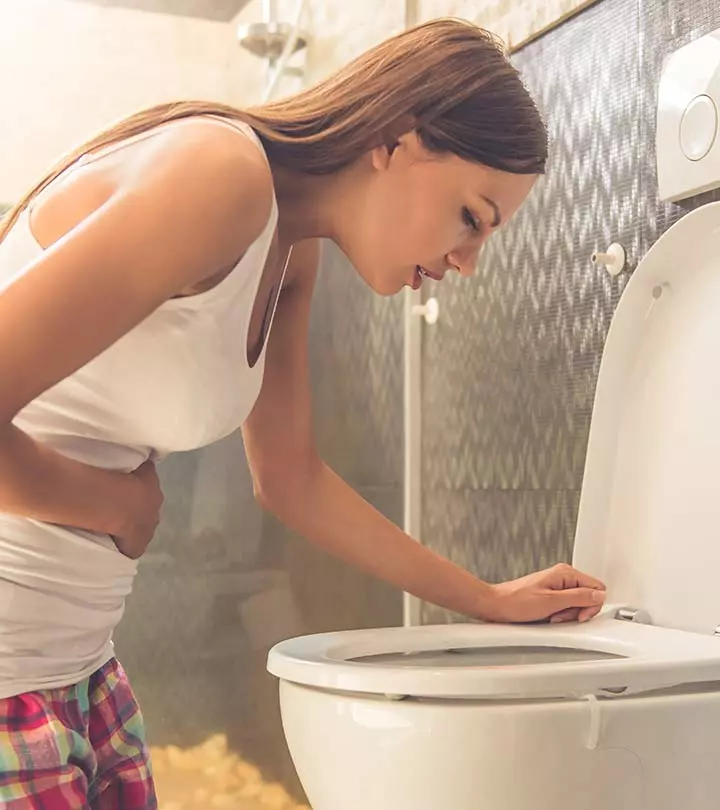
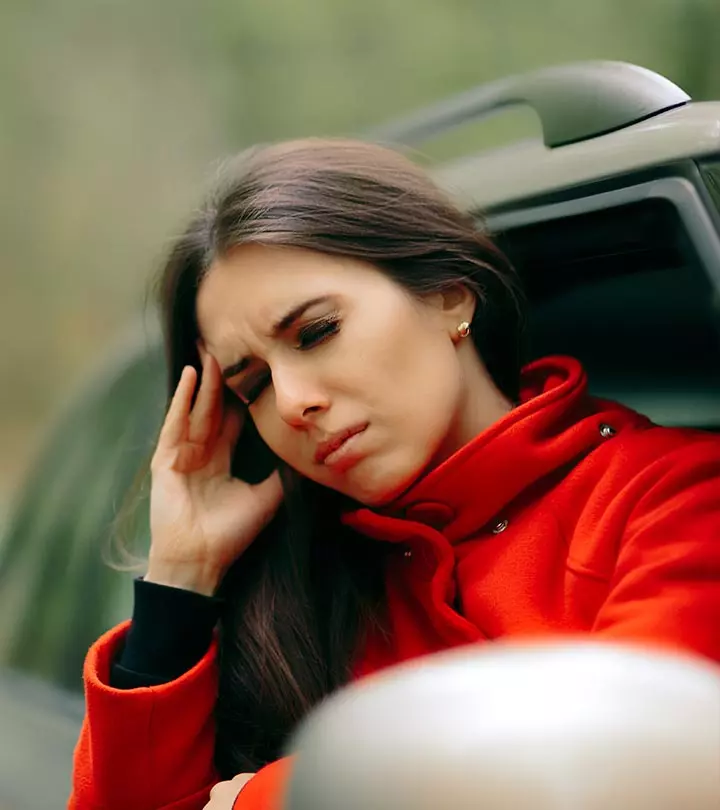
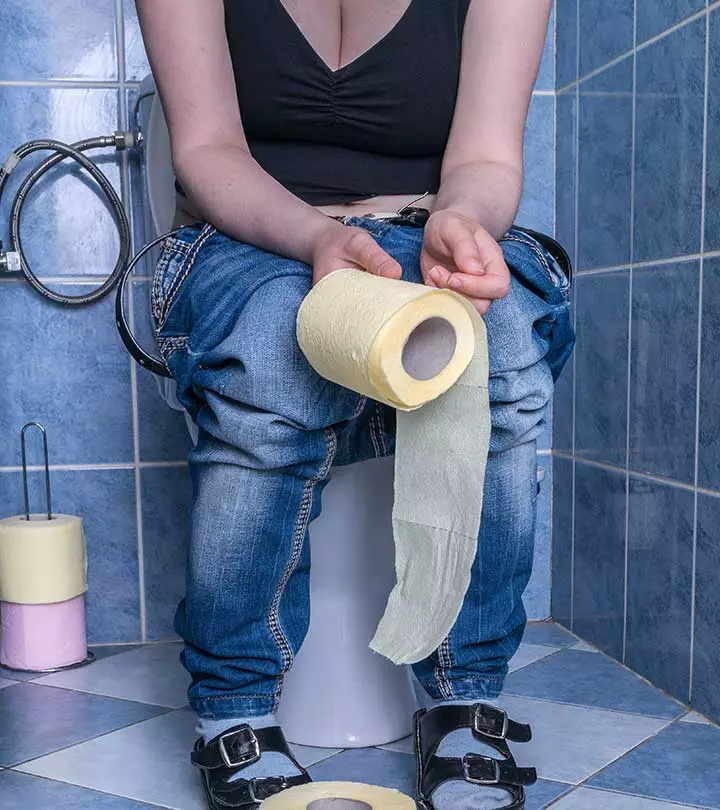
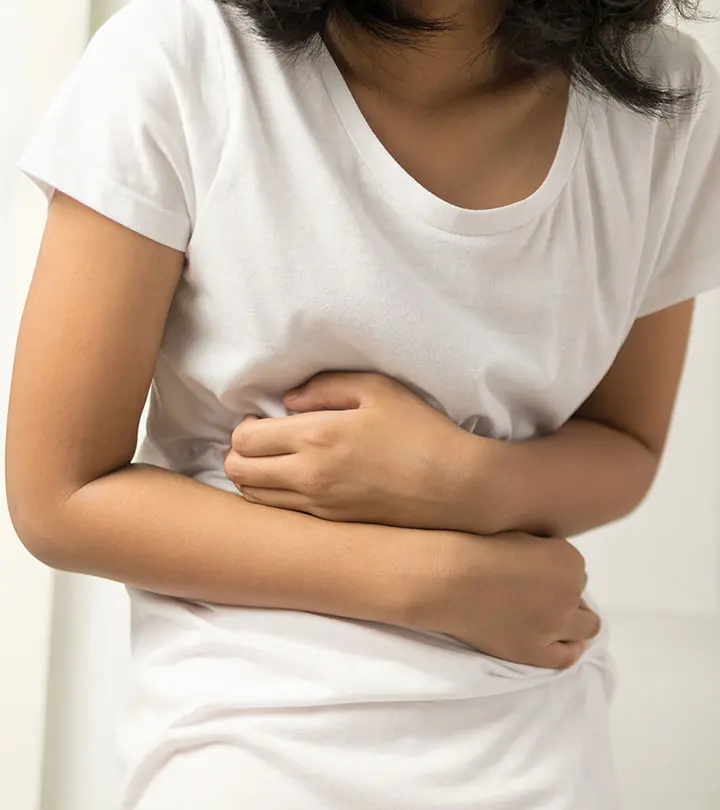
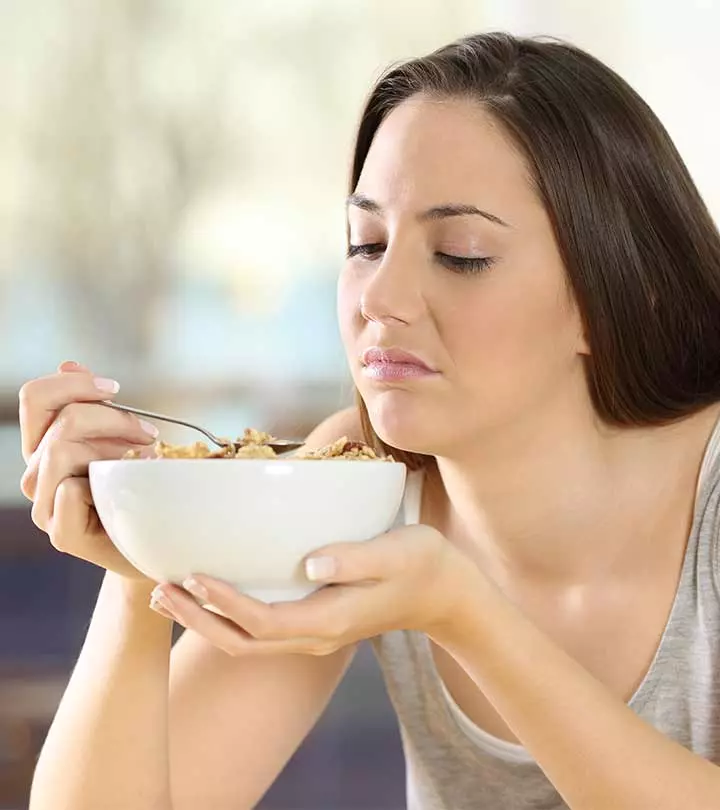
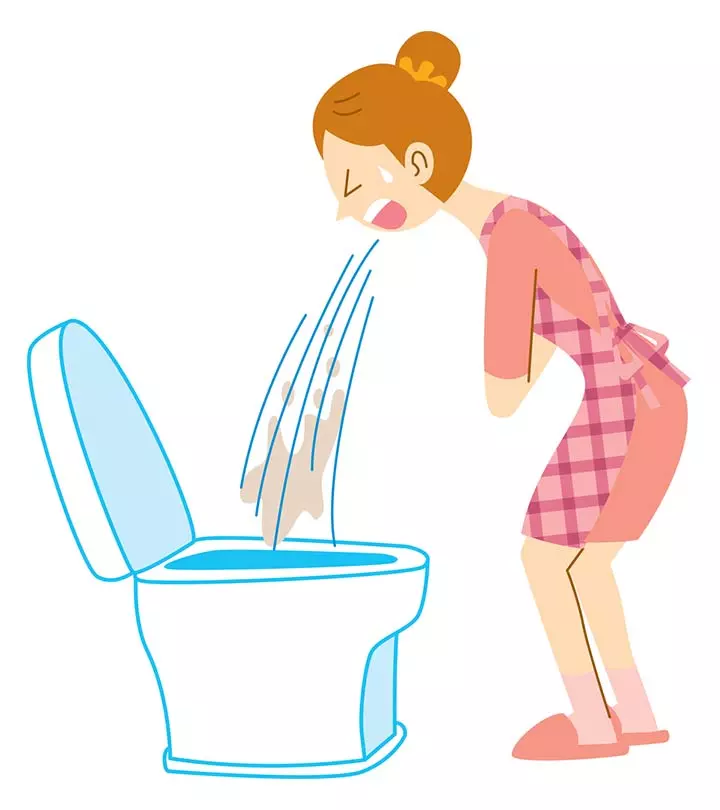
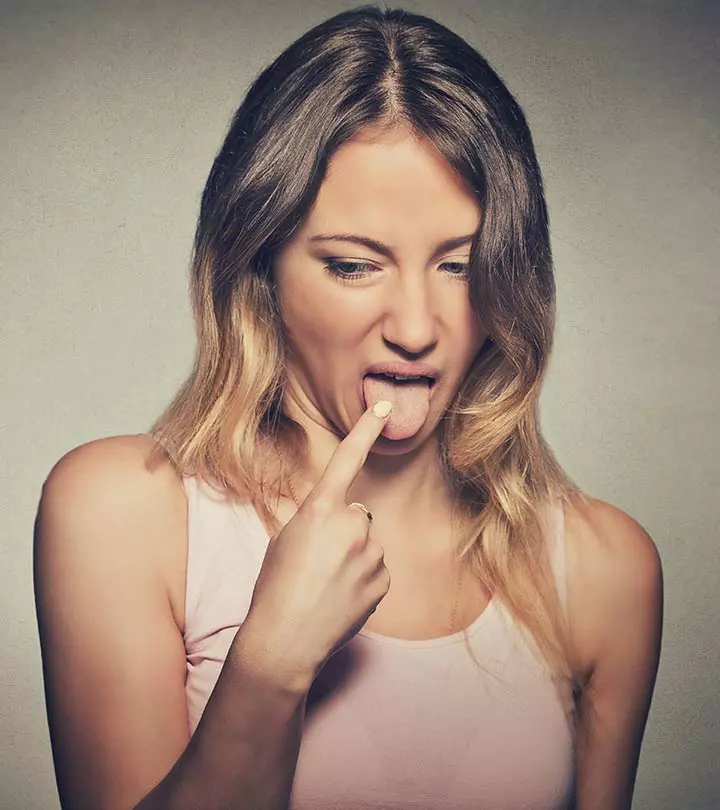
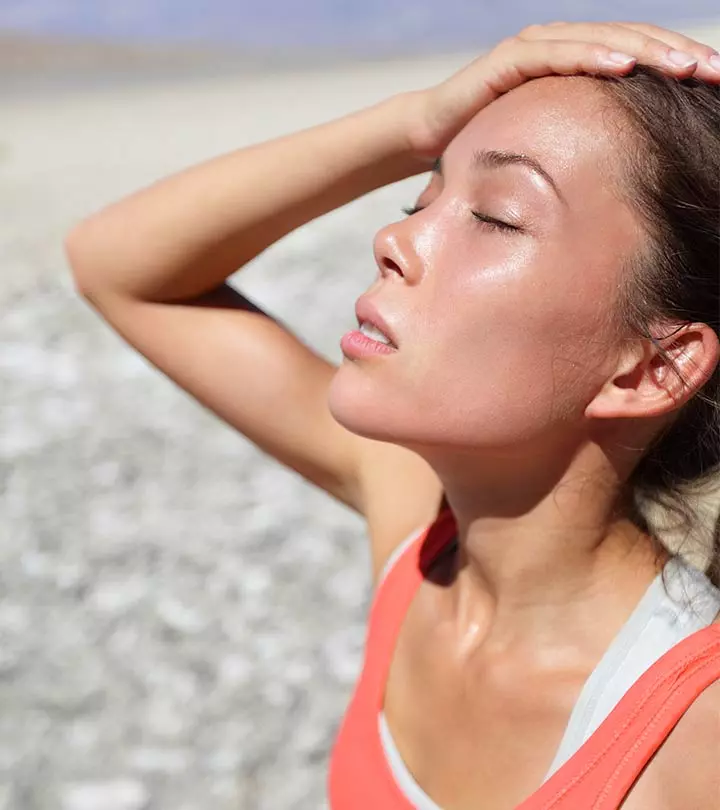








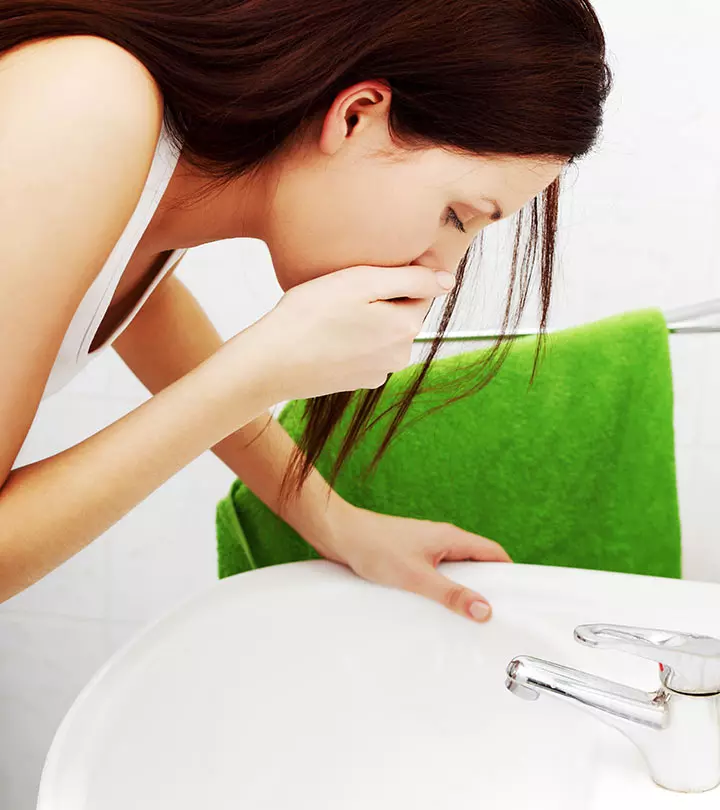
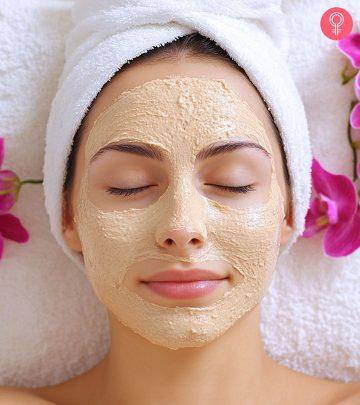
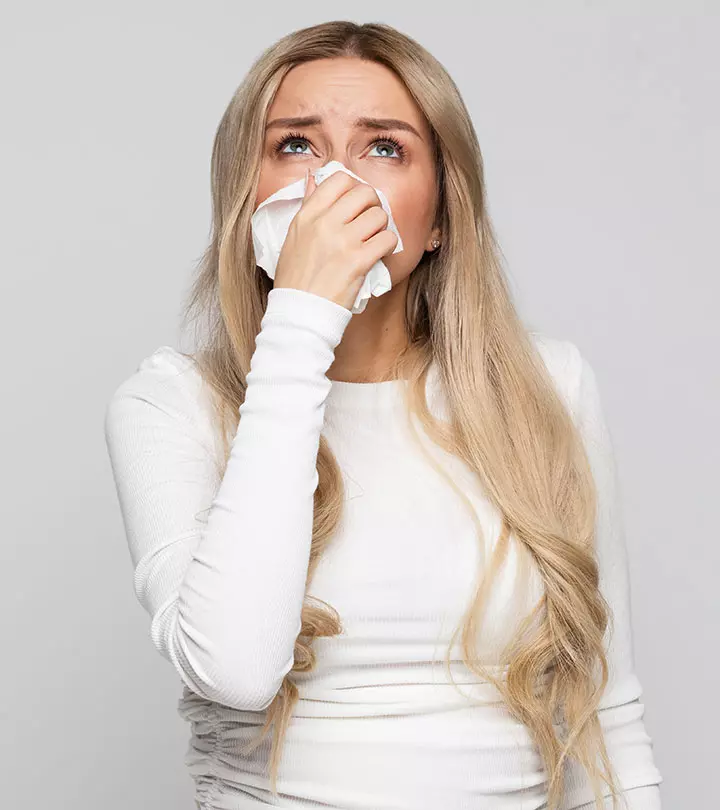


Community Experiences
Join the conversation and become a part of our empowering community! Share your stories, experiences, and insights to connect with other beauty, lifestyle, and health enthusiasts.